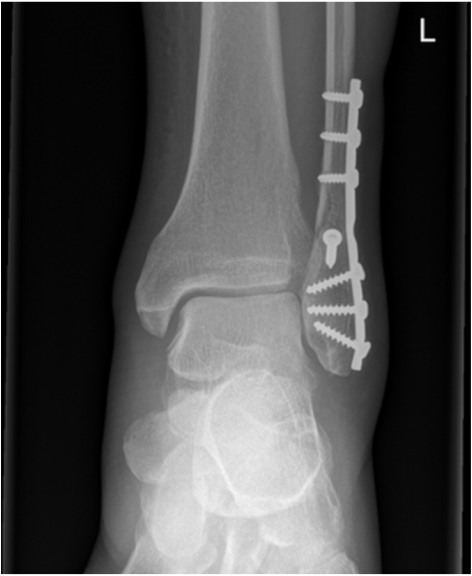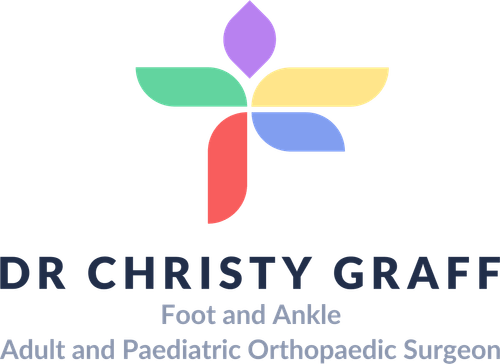Ankle Fracture Surgery (ORIF)
Ankle Fracture Surgery (ORIF) Information Sheet
Ankle Fracture Surgery (ORIF)
- Surgical options may include:
- ORIF: Open Reduction (putting the bones in the correct position) and Internal Fixation procedure involves realigning the broken bones and securing them in place using metal plates, screws, rods and/or pins
- X-rays are used in theatre to make sure the bones are aligned correctly, and there is a tourniquet placed around the thigh to help with bleeding L

The Hospital Stay
- You will wake up with a moonboot
- Your foot will be elevated overnight, and you have antibiotics through a drip
- You will need blood thinning medications to thin your blood and vitamin C 1g daily
- You will stay in hospital for 1-2 nights with antibiotics, blood thinners, regular paracetamol, regular laxatives, regular vitamin C and stronger pain killers to take if and when required
- You will be only allowed to touch your foot to the ground for 2 weeks for balance
- Depending on your balance and strength, you may need rehabilitation post-operatively
When You Go Home
- You will need medications for pain relief; regular paracetamol (2 tablets four times a day) is recommended, as well as strong pain killers, especially at night before bed. These can have side effects of drowsiness, nausea and constipation, and other tablets to help with these side effects may be required.
- You will need blood-thinning medication to prevent blood clots and vitamin C 1 g daily for 6-12 weeks.
- You will need a shower chair and bags to keep the moonboot dry for the first 2-3 weeks.
- You will need to attend your post op appointment in 2-3 weeks where the wounds will be checked.
- After this, you will be able to shower with a shower chair out of the boot.
Rehabilitation
ALL patients are different. These timelines are only a guide, and some patients may progress faster or slower than others.
0-3 weeks
- You will be in a moonboot full time for 2-3 weeks; please treat this like a plaster and do not remove it
- You will only be allowed to touch your foot to the ground for balance.
- Please keep your foot elevated and out of bed for toilet only
- You will need to bag the leg for showers
- Pain relief: Please take regular paracetamol with meals and before bed; stronger painkillers are often needed, especially before bed
- Please take antibiotics, blood thinning medications and vitamin C for 6-12 weeks as prescribed
2-3 weeks
- Post op appointment: dressings are changed and an x-ray is taken
- You can then take the foot out of the boot for showers but wear it for bedtime
- You can start static strengthening. range of motion and balance exercises with physio
- If you do not have a syndesmosis injury, you can start progressive weightbearing in a boot
- If you have a syndesmosis injury, please follow post op rehabilitation as per 'Syndesmosis Injury Surgery'
6 weeks
- You will have an x-ray
- If you do not have a syndesmosis injury, you can fully weightbear in supportive sneakers (you will still have ongoing swelling)
- You can start swimming and cycling
12 weeks
- You will have another x-ray.
- You can increase weight-bearing and strengthening.
6 months
- You may have another appointment and an x-ray
- You will be feeling more 'yourself and improved pain relief in the foot
12 months
- You may have another appointment and an x-ray
- If the bones are healed, you may be discharged
- Some patients request removal of the metal as it can be quite prominent; this will be a minor second surgery
When Can I Drive?
- Left foot 3-4 weeks (if driving an automatic car)
- Right foot 6-8 weeks
When Can I Return To Work?
- Seated work at 2-3 months
- Prolonged standing 8-12 months
- Heavy labour work 12-18 months
Ankle Fracture Surgery (ORIF) Surgery Risks
- Anaesthetic problems
- Wound/scar problems
- Nerve injury
- Blood clots
- Infection
- Stiffness
- The fracture does not heal (non union)
- The fracture heals in the wrong position (malunion)
- Ongoing pain/swelling/instability
- Arthritis in the ankle joint
- Chronic regional pain syndrome
- The need for further surgery
Contact Us
If you want more information or have any questions or problems, please contact Dr Graff at
admin@christygraff.com or call the rooms at
0493 461 133.

